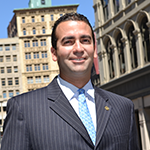 I made the decision to go in-house my sixth year out of law school, and that completely changed my career path.
I made the decision to go in-house my sixth year out of law school, and that completely changed my career path.
My dad is a lawyer, and I can remember going with him to his office and always having respect for lawyers and the profession and study of law from as early as age four. I grew up in San Antonio, Texas. He would introduce me to judges, and I’ll never forget when I met Federal District Judge Ed Prado. He’s known in the area for his sense of humor. I always found judges’ intellect and wisdom so remarkable, but Judge Prado was warm and encouraging—even in high school when we would have discussions about my interests such as debate. Interacting with him and the other judges got me excited about a career in law.
I settled on the University of Texas at Austin and was accepted into the Plan II Honors Program. I couldn’t pass up the opportunity to start my undergraduate career closer to home. UT also had a program that offered smaller classes to the best and brightest from Texas and beyond, which helped reduce the size of the school for me and introduced me to students I would form lasting, meaningful relationships with.
Football is king in Texas, and being at UT gave me the chance to be totally immersed in that culture. From attending football games to rallies at the UT Tower, the traditions I took in really defined my college experience.
My first clerkship was definitely challenging, but it prepared me for the rigor and grind of law firm practice. Working with my coclerks who came from the top of their classes at different universities helped me hone my writing skills. I realized that appellate litigation was what excited me. I enjoyed the challenge of obtaining a reversal and reviewing records. I landed among some great mentors and appellate gurus at King & Spalding LLP, where I had the chance to work alongside them at the state and federal levels. But after doing my fair share of document review, I reflected on the trajectory my career was taking and had a realization.
I think … I limited myself by subscribing to the belief that I needed to work for a white-shoe law firm or return to academia or even strive for the US Supreme Court. While honorable, none of those paths satisfied the desire I had for client interaction, which I found when I decided to go in-house.
My first jump into internal counsel was with CITGO. I was one of a dozen attorneys in this large corporation that was making room for young counsel candidates to develop. I wanted to use this opportunity to become involved in the operational side of the business, negotiating construction and refining agreements and advising the business leaders. I was quickly assigned to federal compliance for a high-profile construction project to build a hydro trigger. Being thrust into that situation with a very specialized background—I had focused on toxic torte law and product defects—I had to become a generalist and learned a great deal while on the job. My colleagues within the legal department taught me a lot, and it was a difficult decision to leave CITGO when I did; however, after again considering my career objectives, I left to pursue a new industry and smaller company with more management opportunities.
At Cosentino North America, we are a growing, entrepreneurial company. At our 20-plus Cosentino Centers across the United States, customers, architects, and designers can view our surface products, learn more about them, and place orders. The Cosentino Centers are the primary vehicles for expanding our distribution model. I am directly involved in reviewing and negotiating the contracts necessary for the Cosentino Center expansion. I am routinely communicating with our CEO and members of the leadership team. Many of our executives are bilingual, and our headquarters is in Cantoria, Spain. These facts are sufficient motivation to improve my Spanish-language skills, and it makes my work with the Hispanic National Bar Association (HNBA) all the more relevant.
I got started with the HNBA in 2010 as a regional deputy and have since become a regional president. I was the president of the Houston Hispanic Bar Association in 2009, and during that tenure, I tried to bring networking, mentoring, and scholarship opportunities to the law schools in and around Houston. I brought that goal to the regional level. Law is a journey you can’t make alone. It is so critical to bring others along in the way others brought me along. I believe networking has played a huge role in my career. It’s completely vital for Latino lawyers to seek out networking opportunities for their own success, and I’m proud to be in a position in my career and associations to foster that.

